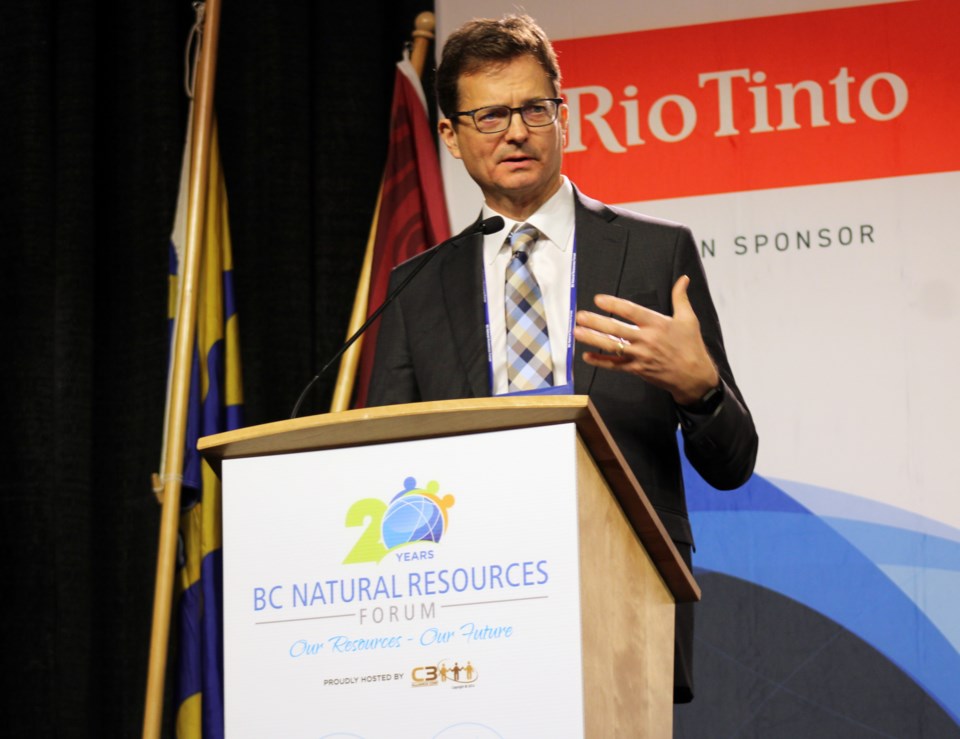To meet increased demand for power in northwestern B.C., the province’s electricity provider BC Hydro announced its plan to twin its transmission line from Prince George to Terrace.
“Today we announced the start of a process to look at twinning the 500,000 volt transmission line between Prince George and Terrace and that would support potential industrial development on the North Coast,” said BC Hydro president/CEO Chris O’Reilly, who revealed details of the project Thursday at BC Natural Resources Forum at Prince George Civic and Convention Centre.
The company is already in the process of completing an upgrade to the existing P.G-Terrace line to install three capacitor stations which will add 500 megawatts, an increase of 60 per cent, to the current capacity. The new line would add potentially another 1,000 megawatts.
O’Riley said there is significant job potential for the project, but the start of construction won’t likely happen this decade.
“It is a long project and it depends on the nature of the regulatory proves and the feedback we get, particularly from First Nations, but these kind of lines can take eight to 10 years, which is why we want to get going and start the conversation,” he said.
BC Hydro anticipates eventually connecting major power infrastructure with the North Coast with anticipation of new mining projects, port facility expansion and the possible all-electric Phase 2 of LNG Canada’s processing plant in Kitimat.
“While we currently have enough transmission capacity to serve the existing committed load to the North Coast with room to spare, we do have an unprecedented queue of potential customers that have applied for service,” said O’Riley.
“Most of those projects have yet not committed to their own investments north until they’ve committed to taking service from BC Hydro. This represents a challenge for us because when you’re in construction transmission lines are expensive projects, they’re time consuming and they have large impacts on the land and on the rights of First Nations.”
O’Riley said there is significant interest in an Indigenous share of ownership across the proposed line, which he supports.
“The lines are quite impactful on the land, they take up a lot of space, and that has to be considered in the environmental review of the line and we would want to hear a First Nations perspective on that before we get locked in on a route,” said O’Riley.
In his morning speech at the forum, O’Riley spoke of the climate crisis facing the world and its changing climate and the havoc disastrous weather has wreaked on British Columbia in recent years and how disruptive that has been to the province’s electricity grid.
“Here in B.C. we’re experiencing more extreme weather and we feel this very directly at BC Hydro in the form of more frequent storms, these alternating periods of extreme drought and intense forest fires that have gotten worse and worse and damage to our forests and rivers and the biodiversity that they rely on.
“Where we once talked about the effects of climate change showing up in 2050 or 2100 we now all know that those alarming changes are occurring today, so it’s critical as a society that we meet our emissions reductions targets.”
He said B.C. is in a fortunate position as home to renewable power system that is 98 per cent clean, which makes the province a leader in Western Canada, but O’Riley pointed out that less than 20 per cent of the total energy we use in the province comes from clean electricity, with 10 per cent from biofuels and the remaining 70 per cent from fossil fuels.
“That absolutely needs to change, and the Clean BC Plan lays out how we intend to do this,” O’Riley. “Electrification is only one of the pathways or actions in the plan that need to be engaged to deliver on these emission targets. The Clean BC Plan calls for our province to be more energy efficient certainly in the building of buildings, to increase the use of biofuels and renewable natural gas to reduce methane emissions in industry, to implement a hydrogen strategy, to pursue negative emissions technologies and more.
“We need progression all these areas across our entire society to meet these emissions targets and achieve the goals we’ve set for ourselves and we will not be able t get there relying on electricity alone.”
BC Hydro is in the first year of its five-year $260 million Electrification Plan, announced in October, which provides incentives for corporate customers to switch from fossil fuel to electricity. O’Riley said three-quarters of its 25 largest customers in B.C. have aggressive climate action goals to get on board with the plan.
“With increased interests in electrification, many are asking if we have enough power and the short answer to that is yes, for now, especially with Site C coming on board in a year or so,” said O’Riley.
“We’re coming up in about three-quarters of the way done. Our first power date is next winter and we do have a shot at getting first power in December. The project is moving along very well. The dam is almost done and a lot of the civil work is done. We’ve got a good years of work left.”



